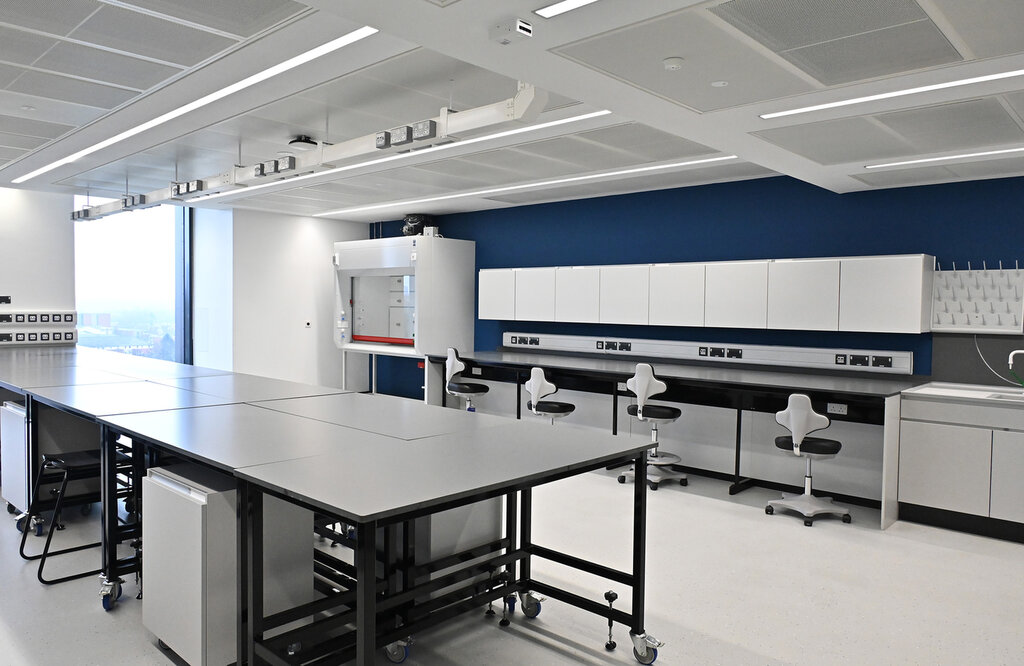Company Insight
Sponsored by Precision Health Technologies Accelerator
From heavy industry to health innovation: Birmingham’s next industrial revolution
Professor Gino Martini is the Chief Executive of Precision Health Technologies Accelerator based at Birmingham Health Innovation Campus
Main image credit:
The UK’s second city has a long history of innovation, creativity and forward thinking. The birthplace of the Industrial Revolution, Birmingham was once hailed as ‘the city of a thousand trades’ – the world’s first manufacturing city. Although dominated by the automotive industry in the 20th century, a new sector is emerging as the champion of the region – and it’s one that may surprise.
With a unique concentration of prestigious education, research and clinical institutions, Birmingham is one of the few global cities truly equipped to become an international leader in health and life sciences.
The pedigree certainly exists – here, pacemakers and plastic heart valves were developed; allergy vaccines were pioneered; the key components of artificial blood were synthesised; and the first clinical trials of the contraceptive pill outside the US were carried out.

Quietly, the region has been building one of the most dynamic data-driven healthcare and medtech economies in the UK. Home to an estimated 391 companies, the life sciences sector in the West Midlands employs around 34,000 people, turning over £16.4bn per year and contributing £3bn in GVA annually. Small to medium enterprises (SMEs) make up 90% of the sector, including 111 micro-businesses, with an average annual growth rate of 3.8%. Of these companies, 59 are classified as high-growth firms – growing at over 20% annually.
This growth, and the huge potential in the city, were recognised in 2020 by the-then Department for Business, Energy and Industrial Strategy (BEIS), who conferred ‘Life Sciences Opportunity Zone (LSOZ)’ status on Birmingham – one of only six sites to receive this designation.
Centred around the Birmingham Health Partners ecosystem – which brings together academics from the University of Birmingham, Aston University and six research-intensive and specialist NHS Trusts – the LSOZ ably demonstrates that the city has all the vital ingredients for health and medical innovation.
Birmingham Health Innovation Campus
A 10-acre former brownfield site, Birmingham Health Innovation Campus (BHIC) is the UK’s largest life science park co-located with a Russell Group university and major teaching and research NHS Trusts. The campus – which has just opened the doors to its first building, No.1 BHIC – will provide a total of 657,000 sq ft of state-of-the-art lab, office and incubation space.
The focal point of this first phase of development is No.1 BHIC’s anchor tenant – the Precision Health Technologies Accelerator (PHTA). Occupying 65,000 sq ft over the top three floors of the building, PHTA is the University of Birmingham’s flagship life science research hub. PHTA provides Category 2 lab and office space for up to 20 SMEs – as well as catalysing vital collaborations with key opinion leaders in an array of medical and scientific specialties. It is also home to the core capabilities for the campus that will support the commercial businesses based there: Clinical Immunology Services, PHTA Industry Trials Hub, and medtech Makerspace.

What’s notable about PHTA is that it isn’t a refurbishment or repurposing of existing facilities – it has been custom-designed by scientists, for scientists, and the scope for sustained growth is almost limitless: the wider ten-year masterplan for BHIC will provide opportunities for bespoke facilities in forthcoming buildings, allowing successful PHTA residents to graduate to larger labs in subsequent BHIC phases. Overall, the development is set to create over 10,000 new jobs and contribute £400m GVA to the regional economy during the 2030s.
Businesses working with PHTA also benefit from comprehensive support from the earliest stages of innovation – including intellectual property protection and advice on investment and financing – as well as access to a talent pool of some 7,000 life sciences graduates per year. Ultimately, its aim is to make it as easy as possible for the region’s entrepreneurs, spin-outs and growing businesses to find the talent, expertise and facilities they need to thrive – benefiting patients and our local communities.
People and place
It’s significant that this is taking place in Birmingham for another reason too – its people. With a large, stable and diverse community, we are a ‘world within a city’, representing the global population in terms of its ethnic profile and socioeconomic demographics. For example, 52% of Birmingham’s residents are of a Black, Asian or minority ethic background. It is also a young city, with 72% of the population aged under 45. When it comes to clinical trials, this is invaluable – where trials have diverse, representative participants, their results are applicable to a greater number of people too.

Building health resilience
While traditionally life sciences businesses have been clustered around the ‘Golden Triangle’ of London, Oxford and Cambridge, expanding lab provision in other areas builds resilience and futureproofs the entire UK life sciences sector. PHTA is therefore an inclusive facility open to any SME or entrepreneur – regardless of their origin or current location.
Ultimately, supporting life sciences businesses to succeed goes far beyond offering lab space – and Birmingham’s expert clinical-academics are ideally placed to help industry partners to develop, validate and commercialise their health solutions for patient benefit.
Contact information
Precision Health Technologies Accelerator
No.1 BHIC
Birmingham Health Innovation Campus
Aston Webb Boulevard, Selly Oak
Birmingham, B29 6SJ
Tel.: +44 (0)7951 916 431
Email: info@phta.co.uk
Web: phta.co.uk
